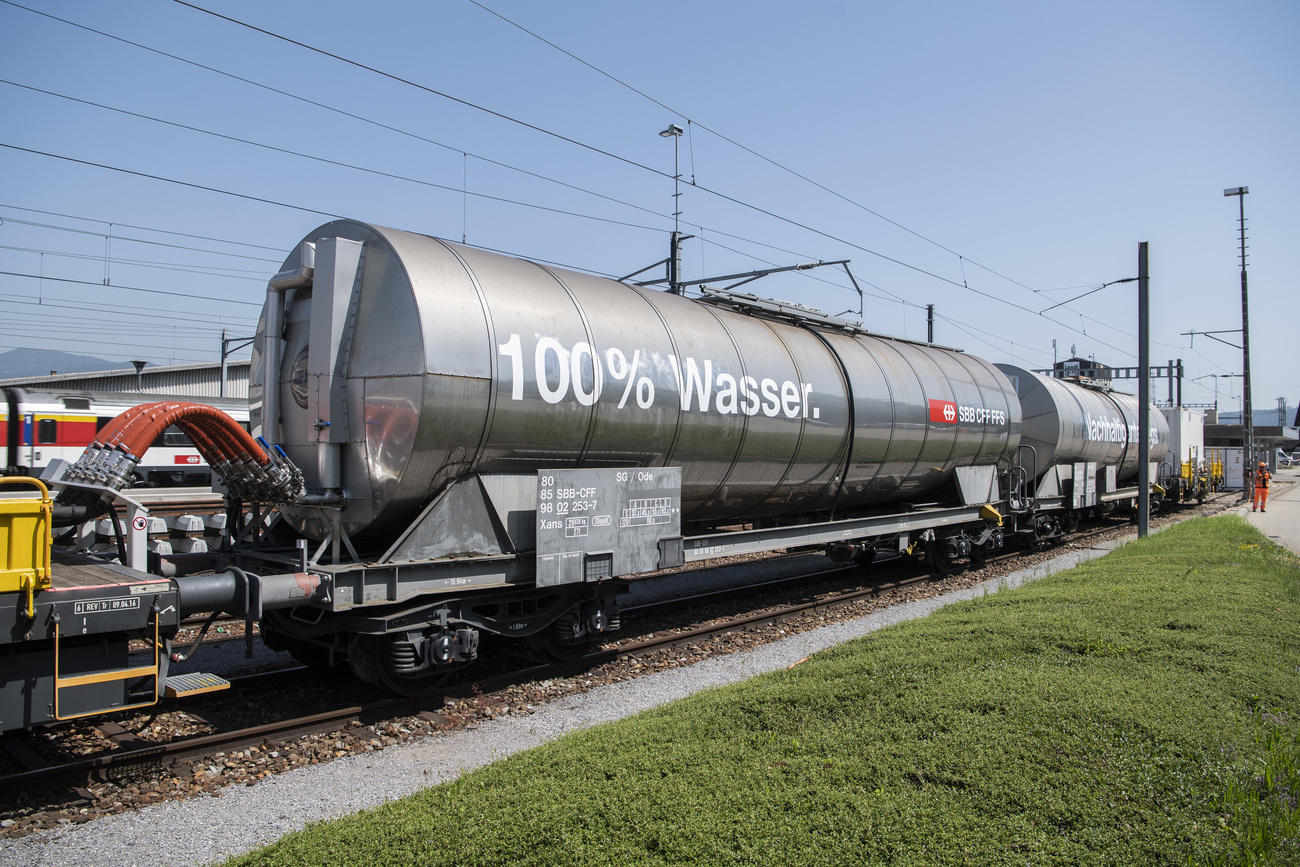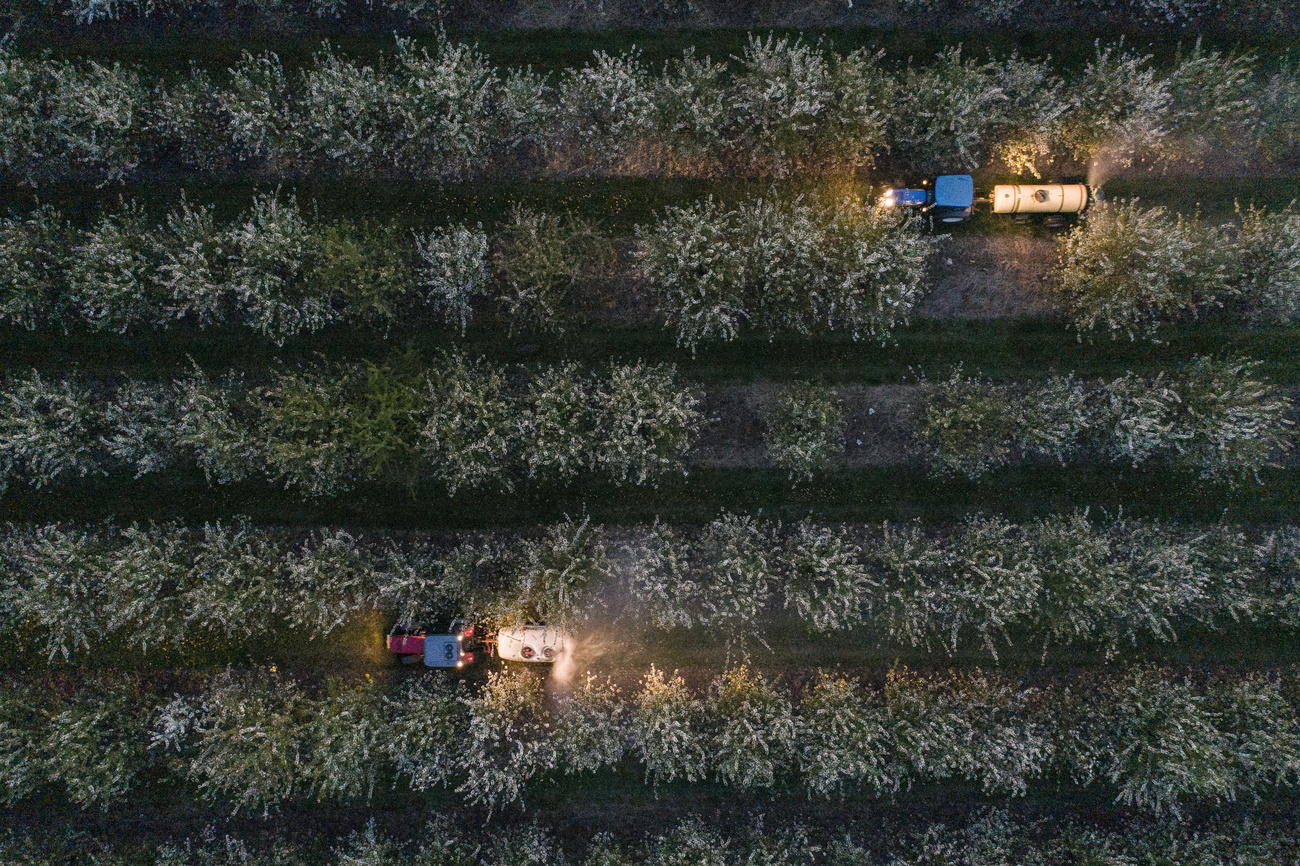
Switzerland nurtures secrecy on pesticides

In Switzerland, approval procedures for controversial pesticides are still far from transparent, fueling strong suspicions of collusion between the authorities and industry.
Chlorpyrifos and Chlorothalonil: The names of these two pesticides are far less familiar to the general public than the highly contested glyphosate. However, in June the Swiss authorities announced their withdrawal from the market, after reassessing their harmful effects.
“These are old molecules that were introduced in the 1960s and whose health and environmental problems have long been known,” explains Nathalie ChèvreExternal link, an environmental toxicologist at the University of Lausanne. “Chlorpyrifos is a cousin of sarin gas, and is associated with IQ deficiencies in children.”
In Chèvre’s view, the timing of the withdrawal is not coincidental. “Very often, products are banned once they are no longer profitable and the manufacturers are ready to put financially more attractive molecules on the market. In this specific case, political pressure certainly also played a role.”

More
Swiss railways to phase out use of glyphosate by 2025
‘No political timing’
Swiss environmental organisations share this suspicion. Last week, parliament debated two citizens’ initiatives aimed at drastically restricting the use and sale of pesticides in Switzerland. The two initiatives, which will be put to popular vote next year, currently enjoy a high level of support among the population.
Faced with this groundswell of citizens and non-governmental organisations (NGOs), the Swiss authorities now have to make some concessions, says Philippe Schenkel, a specialist on agriculture at GreenpeaceExternal link. “Up to now, the Federal Office for Agriculture (FOAG) External linkfavoured the interests of farmers and the agro-chemical industry. But it can no longer turn a blind eye to the huge wave of mistrust that has grown within the population with regard to pesticides.”
The FOAG, which is responsible for approving and reassessing the use of pesticides in Switzerland, denies that its decisions are linked to a political agenda. “Since 2011, we have been carrying out a targeted review of plant protection products approved in Switzerland,” explains Olivier Félix, in charge of sustainable plant protection at the FOAG. “The goal is to reassess the risks based on recent scientific knowledge. At present, 33 pesticides are being re-evaluated and some of them might soon be banned.”
Two popular initiatives aimed at combatting pesticides have been filed in Switzerland. The first, “For a Switzerland free of synthetic pesticides”External link, seeks a ban on pesticide use in Switzerland and on the import of food containing pesticides. The second initiative, “For clean drinking water and healthy food”External link, aims to cut direct subsidies to farmers who use pesticides or antibiotics.
In mid-June, a majority of deputies in the Swiss parliament’s House of Representatives (lower chamber) deemed that these two texts went too far and rejected them without a counter-project. The matter will now be examined by the Senate (upper chamber). Swiss citizens will be called upon to vote on the two initiatives next year.
In the “stone age” of transparency
Félix hammers the message home loud and clear: political and economic considerations play no role in the pesticide approval process in Switzerland.External link The 50 or so specialists dealing with the issue in the different federal offices work with complete independence and in close collaboration with specialised agencies in other countries.
“For reasons of efficiency, we rely particularly on the toxicity and ecotoxicity studies carried out by the European Food Safety Authority (EFSAExternal link), the agency responsible for approving pesticides within the European Union (EU),” says Félix.
Plant protection products may only be authorised if they have no “unacceptable” side effects on health and the environment. Studies carried out by industry must respect internationally recognized scientific protocols. Owing to a lack of resources, the federal authorities are, however, unable to repeat the tests themselves.
The problem, though, is that these studies are kept closely under wraps, and the FOAG does not disclose the reasons why a pesticide has been approved or banned. “Switzerland is still in the stone age in terms of transparency, compared to what is done in the EU. It is only when it comes under pressure that it decides to take a few timid steps,” notes Laurent Gaberell, a specialist on the issue with the NGO Public EyeExternal link.

Biased studies?
In the EU and even in some emerging countries such as Brazil, where agro-business nonetheless has considerable clout, a public consultation is organised as part of the registration process, before a new pesticide comes onto the market. Nothing like this happens in Switzerland, where opaqueness reigns – a situation that environmental NGOs denounce as unlawful.
Thus, independent scientists do not have access to the toxicity and ecotoxicity studies on which the authorities base their decisions. “Whenever I asked to see the data, the different federal offices just kept passing the buck, and in the end, I never got hold of the information I wanted,” says Chèvre.
She is also convinced that the tests are not always carried out in conditions that reflect the pesticides’ actual use in the natural environment. “The industry tests only a small number of animal and plant species. For instance, they often use the same kind of algae, one that is known to be least sensitive to toxic substances.”
The FOAG promises improvements
For the first time, the FOAG has publicly acknowledged shortcomings. “There is a need for greater transparency, and today it may seem as if some things are being concealed,” Félix concedes. “It was perhaps a mistake on our part not to communicate more actively. We are currently looking at ways we can provide more information to the general public.”
While EFSA intends to promote greater access to approval documentation after the fierce controversy over glyphosate, Félix announces that Switzerland is ready to take a step towards greater openness and transparency. “The final decision lies with the cabinet, however. We must not forget that the data belong to those that produce them, that is the agro-chemical companies,” he cautions.
swissinfo.ch has moreover learned that the audit firm KPMG is currently evaluating the entire Swiss approval system. Its report is due to be released in the fall. Among the different improvements proposed, the creation of an independent decision-making body for approving pesticides is on the whole favourably viewed by environmental organizations.
These organizations also note that progress has been made in recent months. Thanks to a decision in March 2018 by the Swiss Federal Court, the country’s highest judicial body, environmental organisations will now have a say in the assessment process.
“After years of stalemate, this is a first step in the right direction,” says Schenkel. “But there is still much work to be done before we can finally eliminate the dozens of dangerous pesticides currently in daily use in Switzerland.”
You can contact the author of this article via Twitter: @samueljabergExternal link

More
Pesticide companies ‘seriously deficient’ on human rights, says UN toxics expert
Translated from French by Julia Bassam

In compliance with the JTI standards
More: SWI swissinfo.ch certified by the Journalism Trust Initiative



























You can find an overview of ongoing debates with our journalists here . Please join us!
If you want to start a conversation about a topic raised in this article or want to report factual errors, email us at english@swissinfo.ch.